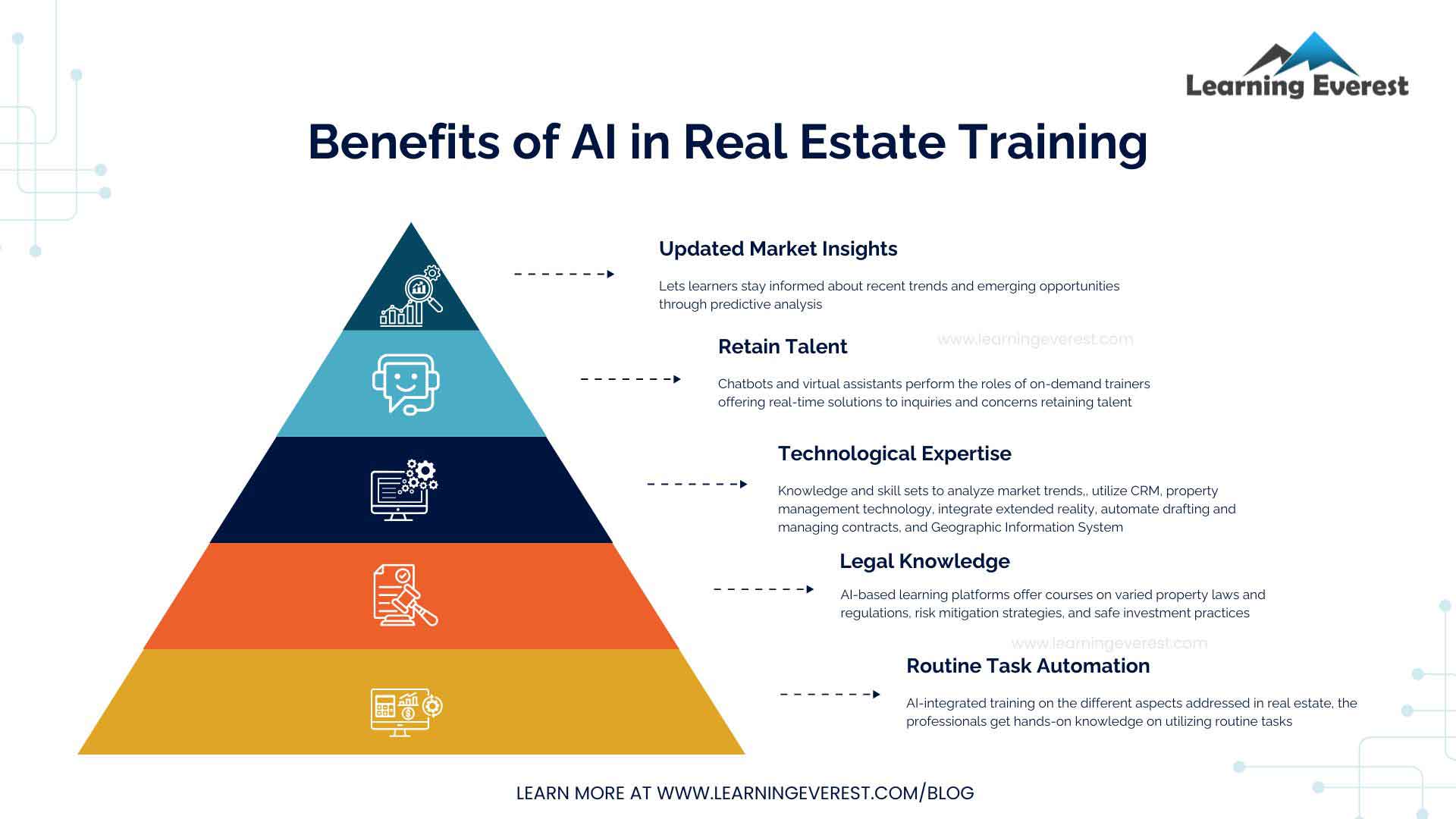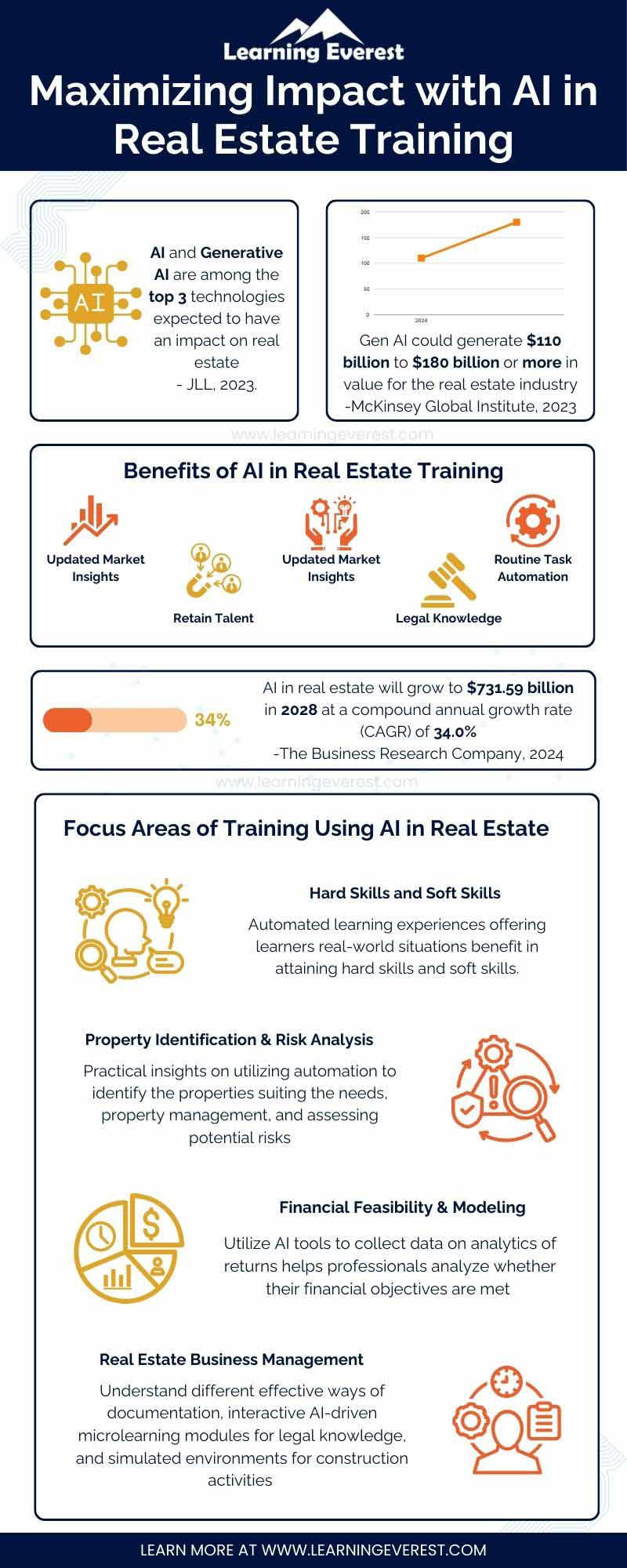AI in real estate opens new possibilities for innovation by transforming every aspect of the business. However, smarter operations and services require training the agents and the employees on the application of AI in the field. The following paragraphs discuss the role and the benefits of AI in real estate training and the different areas that require training on integrating AI in real estate.
Table of Contents
The Role of AI in Real Estate
Artificial Intelligence is creating a significant transformative impact on the real estate sector ranging from property management, investment, client relationship, leasing, sales and marketing, and financial tracking. The technologies include machine learning, Natural Language Processing (NLP), and computer vision. According to JLL, “AI and Generative AI are among the top 3 technologies expected to have an impact on real estate.” AI integrates predictive analysis to predict the latest market trends, search properties, property values, and suggestions regarding investment options.
Furthermore, artificial intelligence has the capability to identify fraudulent activities, thereby enabling decision-makers to avoid falling victim to such schemes. and Generative AI focuses on designing new content or predictions based on existing data, creating customer engagement, offering more informed investment options, and generating market content. A statistical analysis by McKinsey Global Institute suggested that “Gen AI could generate $110 billion to $180 billion or more in value for the real estate industry.” These models help professionals customize designs, offer personalized recommendations, and foresee future trends in property management and investment.
Benefits of AI in Real Estate Industry Training
The real estate industry, similar to other sectors is evolving with market changes, technological advancements, and regulations. To equip professionals in real estate organizations with the skills and knowledge related to the sector, training on various aspects related to the industry is vital. The integration of AI in real estate training offers some critical benefits including:

Benefits of AI in Real Estate Training
Updated Market Insights
The incorporation of AI in real estate training offers updated market insights to let learners stay informed about recent trends and emerging opportunities. For employers, realtors, and agents, the training offers data-driven insights and enables them to use predictive analysis using AI tools. The multimodal training involving infographics, videos, and images can represent the data visually and can be easily designed using AI tools reducing the efforts in crafting content. Moreover, AI-driven training analyses the market risks and informs learners on safe investment practices.
Retain Talent
AI-enabled training offers solutions to retain talent within the industry and clients in this competitive landscape. The chatbots and virtual assistants perform the roles of on-demand trainers offering real-time solutions to inquiries and concerns outperforming the previous training features. In addition, AI in real estate training offers personalized insights to the learners on a wide range of topics involving handling inquiries, property visits, management, financial planning, and assistance in the buying or renting process enabling skill enhancement.
Technological Expertise
The most crucial benefit of AI-driven real estate training is that it offers technological expertise on different aspects of real estate. Learners gather knowledge and skill sets to analyze market trends using the tools, utilize CRM to manage sales and customer engagement, property management technology, integrate extended reality for visualizing experiences, automate drafting and managing contracts, and Geographic Information System (GIS) skills. Technological expertise offers credibility to the agents and other employees in an organization.
Legal Knowledge
Thorough knowledge of legal aspects is critical in the real estate business as professionals should possess comprehension of the various types of ownership rights and property claims, property validation documents, and property laws related to the area and the nation. AI-based learning platforms offering courses on varied property laws and regulations, risk mitigation strategies, and safe investment practices benefit the participants.
Routine Task Automation
The routine tasks in the real estate industry can be simplified by utilizing AI. Through AI-integrated training on the different aspects addressed in real estate, the professionals get hands-on knowledge on utilizing them. The routine tasks include property listings management, property validation and appraisal, background checks, invoice management, compliance, document management, financial reporting and budgeting, etc. For instance, automating data entry or managing property listings.
Focus Areas of Training Using AI in Real Estate
The future of AI is expected to grow in the real estate sector studies suggest “it will grow to $731.59 billion in 2028 at a compound annual growth rate (CAGR) of 34.0%.” (Source: The Business Research Company). This encompasses the training sector which addresses the different aspects of real estate. Here are the focus areas covered in AI-driven training in Real Estate.
Hard Skills and Soft Skills
The hard skills associated with real estate professionals include negotiation, objection handling, presenting, market analysis, marketing and advertising, and property management while the soft skills include communication, tactfulness, problem-solving, time management, collaboration, and relationship management. Through simulations and automated learning experiences offering learners real-world situations, professionals benefit in attaining these skills.
Property Identification and Risk Analysis
AI-powered training platforms provide practical insights on utilizing automation to identify the properties suiting the needs, property management, and assessing potential risks. The participants benefit from using AI tools to sift through property libraries more automatically than manual browsing, analyze property trends utilizing ML algorithms, and detect risks including depreciation and market downturns, thereby helping in identifying risk elements early.
Financial Feasibility and Modeling
AI-driven training on financial feasibility utilizing automated cash flow, and scenario-based training informs the learners whether the property offers them positive returns. By utilizing AI tools to collect data on analytics of returns helps professionals analyze whether their financial objectives are met or not. Financial Modeling involves documenting the organization’s expenses. Rather than relying on spreadsheets for portfolio management and forecasting, AI training enables professionals to automate the financial model offering accurate projections.
Real Estate Business Management
Real Estate Business Management includes the stages of documentation, legal aspects, construction or related activities, and financial management. AI-integrated training process equips learners to understand different effective ways of documentation, interactive AI-driven microlearning modules can encourage easy retention of legal knowledge, and simulated environments for construction activities are some effective pathways to real estate business management.
Conclusion
To conclude, the role of AI in Real Estate ranges from property management, investment, client relationships, leasing, sales and marketing, and financial tracking. AI in real estate industry training benefits professionals by offering updated market insights, retaining talent, technological expertise, legal knowledge, and routine task automation. The focus areas of training utilizing AI in real estate include training on hard skills and soft skills, property identification and risk analysis, financial feasibility and modeling, and real estate business management. It is recommended that organizations offer AI-enabled training to raise curiosity and engagement in learners while staying updated with the recent real estate market trends.
Infographic
Knowledge Check!
Frequently Asked Questions (FAQs)
What is the role of AI in real estate?
Artificial Intelligence is creating a significant transformative impact on the real estate sector ranging from property management, investment, client relationship, leasing, sales and marketing, and financial tracking.
What are the benefits of AI in Real Estate industry training?
AI in real estate industry training benefits professionals by offering updated market insights, retaining talent, technological expertise, legal knowledge, and routine task automation.
What are the focus areas of training in real estate?
The focus areas of training utilizing AI in real estate include training on hard skills and soft skills, property identification and risk analysis, financial feasibility and modeling, and real estate business management.






